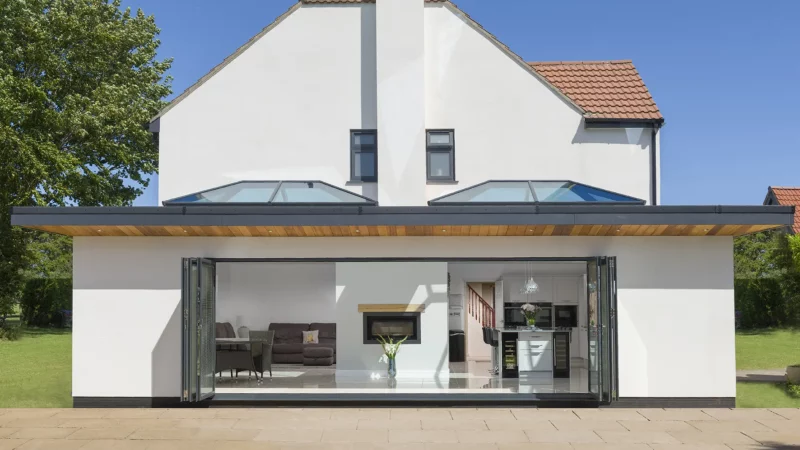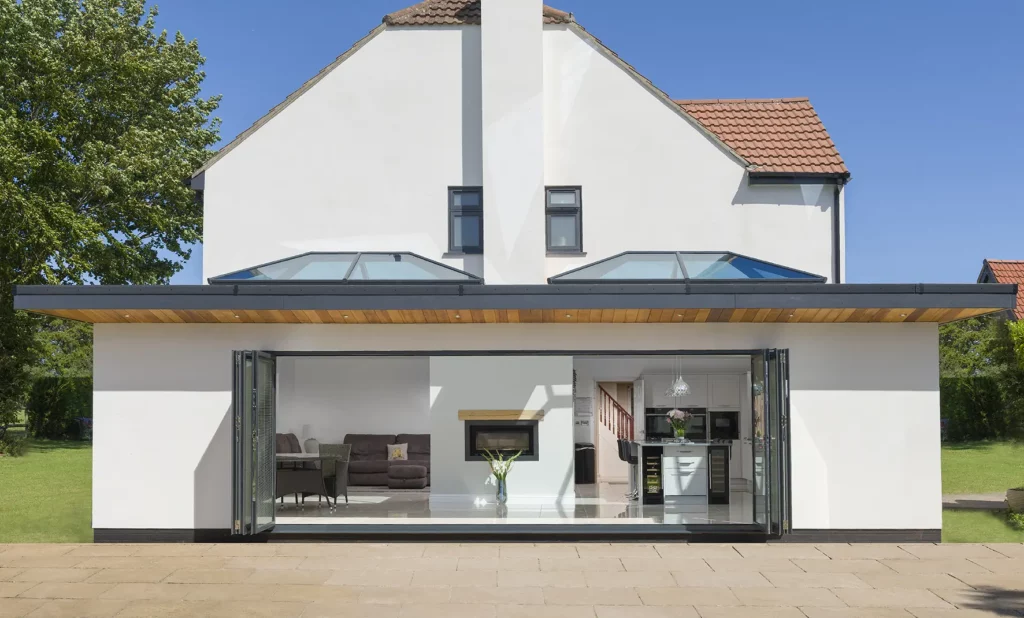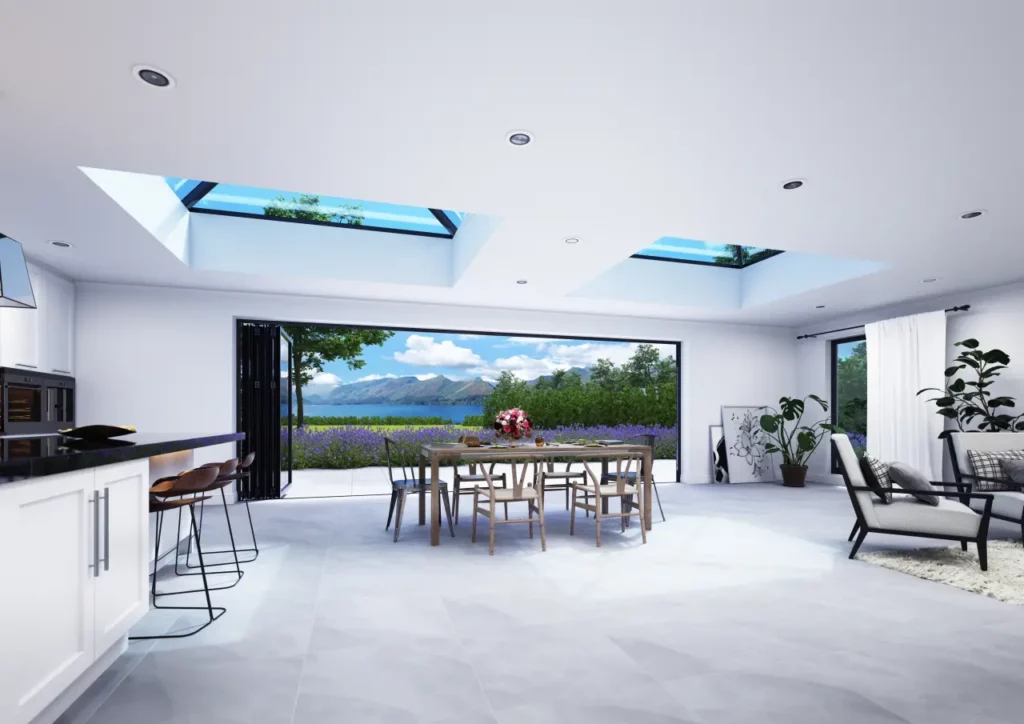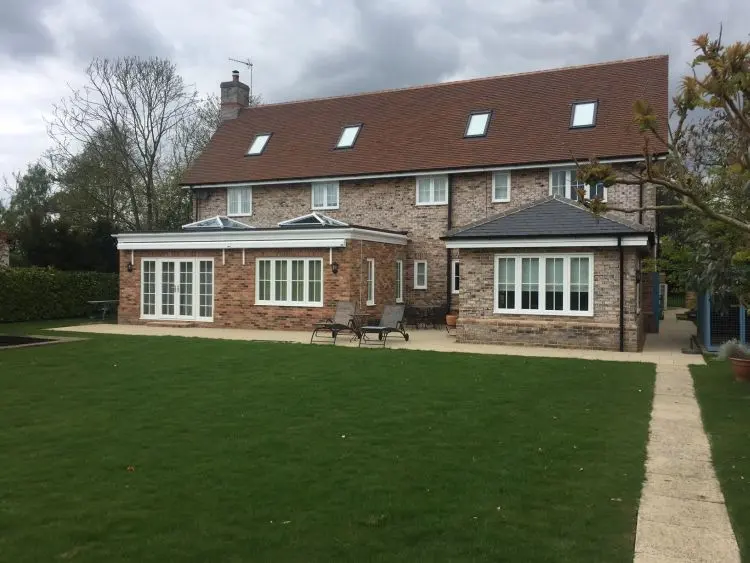Best front door styles for period homes in the South East
Thinking about replacing your front door but unsure what style fits a period home in Kent or Sussex? In this post we explore classic and modern door styles including composite,…
Wondering whether to choose an orangery or a full extension? In this post, we break down the key differences – from cost and planning permission to energy efficiency, aesthetics and how you plan to use the space. Whether you're after more natural light or extra square footage, this guide will help you decide which option is right for your home.

A lot of people ask for information about adding extensions to the back of their properties. The same question almost always follows too – is an orangery cheaper than an extension?
When making such an important decision (that’s going to impact the very place you call home) there will no doubt be a few things on your mind. In this post we have put together all the information you need to help you decide if an orangery is the better choice for you.
Generally, extensions are made entirely of brick with standard windows installed. They are usually added to the back of your property and are built with a heavy tiled roof.
If you are thinking about adding a larger area to your second floor, extensions give the option of adding more vertical space compared to an orangery. As they are larger in size (because of the tiled roof or the second floor) it is a much bigger project to undertake and therefore takes a much longer time to complete.
Orangeries are only partly made of brick – adding to their robustness – but unlike extensions they are built with large areas of glazing too. The main benefit of an orangery is that they let in far more natural light through the window panels and from skypods installed onto the flat roof. For more information on why skypods are the perfect addition to your home improvement project get in touch with us.

Another benefit is that orangeries still acts as a solid extension to your home, giving you the option for electric lighting, plumbing and heating. This ensures that you get a comfy space that can be used night and day, throughout the year.
In many ways, an orangery sits nicely in-between a conservatory and a full extension, with the benefits of both. It has the openness and natural feel of a conservatory while also maintaining the robustness and adaptability of an extension. By now you should be getting a feel for the question is an Orangery cheaper than an Extension.

When extending your living space, waiting to get the green tick from the authorities can be a nerve-racking experience. If you are thinking about an extension, planning permission is nearly always needed as there are stricter regulations to take into account.
Orangeries may sometimes require planning permission, but are usually classified as ‘permitted development’, which means that you can increase your ground floor living space without having to apply for planning.
‘Permitted development’ usually falls under the following rules:
If you need more help working out whether you will need planning permission, remember to book in a free no obligation quote with us. We can go through all of the details and we also help with the paperwork – should you need it!
As extensions are made mostly of brick and have a typical roof (with rafters, tiles and insulation) you might think that they are more energy efficient. However, this isn’t always the case and is often the case that makes an Orangery cheaper than an Extension in the longer term.
As they are larger (especially if they reach to the second floor) they take much longer to heat up and as they don’t have the same access to natural light, they also use far more electricity during the day.
Our orangeries are built using some of the most energy efficient materials on the market. Our skypods also offer ‘Activ blue’ glazing to retain the sun’s heat and reflect harmful UV rays. This means that your orangery stays warm in the winter and cool in the summer.
The roofing materials used in an orangery are also just as effective as those on an extension, with added room for overhead lighting (so the space can be used at night) and high-performance insulation.
Considering that an extension requires more materials, more time to process the planning application and more time to build, it’s probably no surprise to you that an orangery can be less expensive.
Ultimately, it comes down to how you plan on using the space created. If you need to add space to the second floor of your home then a traditional extension may be the better option for you. If you only need a ground floor extension then an orangery is by far the better choice, as it is so versatile it can be used for anything – a larger kitchen to enjoy, a playroom, an office, whatever your home needs.
The other difference to talk about is aesthetics. Extensions and orangeries will both be designed to tie into your property’s current look, where similar materials will be chosen to match your property’s.
However, extensions normally require tiled roofs, where the materials can’t always be an exact match. This means that the roof tiles will normally look a little different to the existing ones.
This can sometimes (not as often) happen with the type of brick being used, but as an orangery uses far less brick than an extension the differences are far less visible.
As an orangery uses a flat roof system, to incorporate skypods and long-lasting weatherproofing, you are always left with a wonderfully modern, sleek addition to your home.

At House of Glass we use 3D imaging to help you visualise how your new orangery will look. We can go through all of the necessary steps and handle all of the hard work so you enjoy the full potential of your home.
Call now for a free, no obligation quote.
Best front door styles for period homes in the South East
Thinking about replacing your front door but unsure what style fits a period home in Kent or Sussex? In this post we explore classic and modern door styles including composite,…
What are the benefits of aluminium windows vs uPVC?
Wondering whether aluminium or uPVC windows are the right choice for your home? In this post, we break down the key differences and benefits of each option – from style…
How do I keep my conservatory cool in summer?
Fed up with your conservatory being too hot to use in summer? Discover practical fixes, energy efficient upgrades, and expert advice on keeping your conservatory cool across Kent and the…